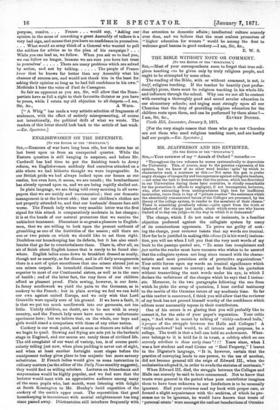ENGLISHWOMEN ON THE DEFENSIVE.
[To THE EDITOR OF THE "SPECTATOR.."] SIR,—Rumours of war have long been rife, but the storm has at last burst upon us from an unexpected quarter. While the Eastern question is still hanging in suspense, and before Mr. Cardwell has had time to put the finishing touch to Army reform, we Englishwomen suddenly find ourselves attacked on a side where we had hitherto thought we were impregnable. In our British pride we had always looked upon our homes as our castles, but even here, it seems, we are unsafe ; the bombardment has already opened upon us, and we are being rapidly shelled out.
In plain language, we are being told every morning in all news- papers that we are untidy and uneconomical ; that our domestic management is at the lowest ebb ; that our children's clothes are not properly attended to, and that our husbands' dinners fare still worse. The French lady whose very sensible letter was the first signal for this attack is comparatively moderate in her charges ; it is at the hands of our natural protectors that we receive the unkindest treatment. Discontent is so great a pleasure to English- men, that we are willing to look upon the present outburst of grumbling as one of the festivities of the season ; still there are one or two points on which we should like to set them right. Doubtless our housekeeping has its defects, but it has also excel- lencies that go far to counterbalance them. There is, after all, an air of finish about English homes that is rarely to be found else- where. English ladies come down to breakfast dressed as neatly, though not as smartly, as for dinner, and in all daily arrangements there is a sort of quiet smoothness that one misses abroad just as one misses carpets. In household cleanliness we think we are superior to most of our Continental sisters, as well as in the care of health ; and of the latter fact, the rosy faces of our children afford us pleasant proof. Plain sewing, however, is our forte. In fancy needlework we yield the palm to the Germans, as in cookery to the French ; but in plain sewing we feel we can hold our own against united Europe, and we only wish that Lord Granville were equally sure of his ground. If we have a fault, it is that we put too much needlework into our garments, not too little. Untidy children, no doubt, are to be met with in every country, and the French lady must have seen some unfortunate specimens here ; but we believe that, on the whole, our boys and girls would stand a comparison with those of any other nation.
Cookery is our weak point, and as soon as dinners are talked of we begin to quail. Stewing and frying are arts yet in the barbaric stage in England, and our sauces are rarely those of civilized life. The old complaint of our want of variety, too, is of course parti- cularly telling just now, when plum pudding is never out of sight, and when at least another fortnight must elapse before the omnipresent turkey gives place to less majestic but more savoury substitutes. If French ladies would give us some instruction in culinary matters (as the editor of the Daily News sensibly suggests), they would find us willing scholars. Lectures on fricandeaux and mayonnaises would be highly popular, and we feel sure that the lecturer would meet with an appreciative audience among many of the same pupils who, last month, were listening with delight at South Kensington to Mr. Huxley's lucid exposition of the cookery of the earth's upper crust. The superstition that good housekeeping is inconsistent with mental enlightenment has long since passed away. Dilettanteisin still interferes frequently with due attention to domestic affairs ; intellectual culture scarcely ever does, and we believe that the most zealous promoters of " higher education for women " would be among the first to welcome good lessons in good cookery.—I am, Sir, &c., E. W. S.






























 Previous page
Previous page